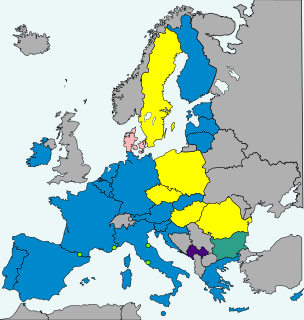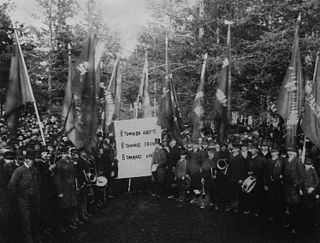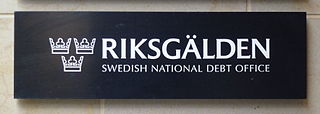 W
WThe economy of Sweden is a developed export-oriented economy, aided by timber, hydropower, and iron ore. These constitute the resource base of an economy oriented toward foreign trade. The main industries include motor vehicles, telecommunications, pharmaceuticals, industrial machines, precision equipment, chemical goods, home goods and appliances, forestry, iron, and steel. Traditionally, Sweden relied on a modern agricultural economy that employed over half the domestic workforce. Today Sweden further develops engineering, mine, steel, and pulp industries, which are competitive internationally, as evidenced by companies like Ericsson, ASEA/ABB, SKF, Alfa Laval, AGA, and Dyno Nobel.
 W
WAktiebolag is the Swedish term for "limited company" or "corporation". When used in company names, it is abbreviated AB, Ab, or A/B, roughly equivalent to the abbreviations Ltd. and PLC. The state authority responsible for registration of aktiebolag in Sweden is called the Swedish Companies Registration Office.
 W
WThe Confederation of Swedish Enterprise or Swedish Enterprise is a major employers' organization for private sector and business sector companies in Sweden. It has 49 member associations representing 60,000 member companies with more than 1.6 million employees.
 W
WElmia Exhibition and Convention Centre is a trade fair in Jönköping, Sweden. The building was built in 1961 for agriculture trade fairs. Later it was expanded to also hold other trade fairs like boat and auto shows. The building has 34,000 square metres floor and is divided into 4 major halls and a few smaller ones.
 W
WThe Housemaid Debate or Maid Debate is a political discussion in Sweden, which begun on 18 July 1993 when Swedish economist Anne-Marie Pålsson proposed tax deductions for household services.
 W
WIn 2005 the government of Sweden appointed a commission to draw up a comprehensive programme to reduce Sweden's dependence on petroleum, natural gas and other ‘fossil raw materials’ by 2020. In June 2006 the commission issued its report, entitled Making Sweden an Oil-Free Society. The report cited four reasons to reduce oil dependence:The impact of oil prices on Swedish economic growth and employment The link between oil, peace and security throughout the world The great potential to use Sweden's own clean renewable energy resources in place of oil The threat of climate change resulting from the extensive burning of fossil fuels
 W
WThe Nordic model comprises the economic and social policies as well as typical cultural practices common to the Nordic countries. This includes a comprehensive welfare state and multi-level collective bargaining based on the economic foundations of social corporatism, with a high percentage of the workforce unionized and a sizable percentage of the population employed by the public sector. Although it was developed in the 1930s under the leadership of social democrats, the Nordic model began to gain attention after World War II.
 W
WThe Royal Patriotic Society is a Swedish royal society founded in 1772 in Stockholm, Sweden, by royal charter of King Gustav III of Sweden, with the aim of improving Sweden's economy, particularly agriculture, mining and the textile industry. The Swedish Royal Patriotic Society awards medals such as Medalj för bevarande av svenskt kulturarv, Medalj För betydande gärning, formerly named Medalj för långvarig gagnande verksamhet, and Medalj för gagnerik gärning inom svenskt näringsliv . The Royal Patriotic Society’s medals are made in 18k gold.
 W
WJosef Ernst Sachs was a Swedish businessman and one of the two founders of the Nordiska Kompaniet department store in Stockholm.
 W
WThe Saltsjöbaden Agreement is a Swedish labour market treaty signed between the Swedish Trade Union Confederation and the Swedish Employers Association on 20 December 1938, that became a model for other agreements. The rules on industrial action have come to be regarded almost as general legal principles of conflicts between the labor market forces. The agreement cemented the Swedish social norm that the two sides shall conclude agreements without interference by government. The agreement is still in effect, with the latest changes being made in 1976.
 W
WSveriges riksbank, or simply the Riksbank, is the central bank of Sweden. It is the world's oldest central bank and the fourth oldest bank in operation.
 W
WSweden does not currently use the euro as its currency and has no plans to replace the existing Swedish krona in the near future. Sweden's Treaty of Accession of 1994 made it subject to the Treaty of Maastricht, which obliges states to join the eurozone once they meet the necessary conditions. Sweden maintains that joining the European Exchange Rate Mechanism II, participation in which for at least two years is a requirement for euro adoption, is voluntary, and has chosen to remain outside pending public approval by a referendum, thereby intentionally avoiding the fulfilment of the adoption requirements.
 W
WThe Swedish Business Awards were established in 2006. The project aims to provide positive examples for international establishments and business development by highlighting the success of cooperation, emphasizing innovativeness, outstanding business achievements and the importance of contributions to society. This initiative promotes internationalization of business and serves as a yearly meeting point to discuss achievements, practices and aims. Culmination of the project is the ceremony which includes presentations, discussions and awards for the most successful international and local companies operating in Lithuania, Latvia and Estonia.
 W
WThe Swedish Employers Association, was a Swedish employers' organization founded in 1902. SAF in 2001 merged with Sveriges Industriförbund and formed Svenskt Näringsliv.
 W
WThe labour movement in Sweden dates back to at least the 1850s, when Swedish workers initiated the organizing of previously spontaneous food riots into strikes, hence acting as an autonomous group.
 W
WThe Swedish National Debt Office was founded by Gustav III at the Riksdag of the Estates in 1789, through the Act of union and security. It is a Swedish Government agency. The first task of the Debt Office was to finance the ongoing War against Russia.